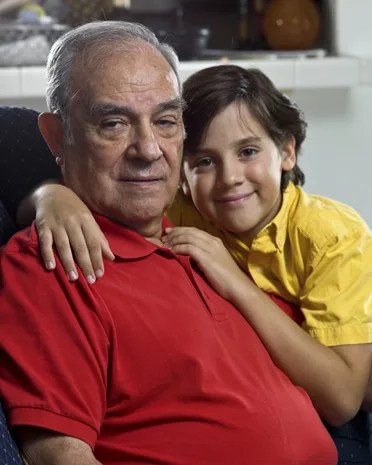We spoke to Matt Kudish, LMSW, vice president and director of education, outreach, and caregiver services for the Alzheimer’s Association, New York City chapter, and Danielle M. Bruzese, coordinator of education, outreach, and caregiver services for the Alzheimer’s Association, New York City chapter, about how to help your children understand Alzheimer’s disease and how to help your children cope when they experience Grandma or Grandpa having a “bad day” with Alzheimer’s disease.
 How can I help my children understand Alzheimer’s disease?
How can I help my children understand Alzheimer’s disease?
DB: The best thing is to be honest with the child. Try to explain Alzheimer’s to them with words and situations they will be able to understand, and let them ask questions. Don’t give so much detail about the science of what’s happening in the brain if the child doesn’t need to know that, but sit them down and explain what the disease is in an honest way. There’s also a really great section on our website just for kids and teens and it lists videos—little clips from YouTube—and books that parents can read to children or that children may be able read themselves. Those videos and books are about other children going through the same experiences, so I think that’s another good way to introduce your child to the disease.
MK: Use language and relatable experiences that make sense for the child’s age and development and then relate it back to feelings, which we can all understand. One of the things that Danielle does really well in the presentations we give to kids is to talk about the emotions and feelings they may experience and situations that cause them to be frustrated, angry, upset, confused, or scared and help them realize that those are the same kinds of feelings that Grandma and Grandpa may be feeling, just for a different reason.
What are some tips to help kids cope when they experience their grandparent having a “bad day” with Alzheimer’s?
DB: I tell the children in the classes to, first and foremost, be patient with the person, to understand that although Grandma or Grandpa may not look ill or sick, they are. We have to understand that their brain is sick. Again, be honest, let your children ask questions, let them know that you’re there any time they want to talk. Remind children that Grandma and Grandpa are still the same person, so the way that the children want to be treated—with love and patience—that’s how we need to treat Grandma and Grandpa, and don’t test Grandma and Grandpa with questions like “Do you remember my name?”
MK: Normalize what they’re feeling. So if Grandma or Grandpa is having a “bad day” and it’s scary to a child, just say, “Yeah, it makes sense that you’re scared. This is scary,” and go back to the facts. “This is a disease, and it isn’t Grandma or Grandpa’s fault, and it has nothing to do with you. We just need to be calm and remember that it’s a disease, that they’re sick.” And again relate it to terms they can understand, like when they haven’t felt well.
DB: I think it’s also good for parents to let children know that they’re scared, they’re nervous, or they’re feeling the same way the children are feeling. Because again, I think it’s all about the child not feeling alone and being able to understand that what they’re feeling and going through is normal.
Matt Kudish, LMSW, is the vice president and director of education, outreach, and caregiver services for the Alzheimer’s Association, New York City chapter. Danielle M. Bruzese is coordinator of education, outreach, and caregiver services for the Alzheimer’s Association, New York City chapter. For more information about the New York City chapter, visit alz.org/nyc.
Also see:
Meatballs & Memories: How One Daughter Saved Her Mother’s Recipes from Alzheimer’s



















